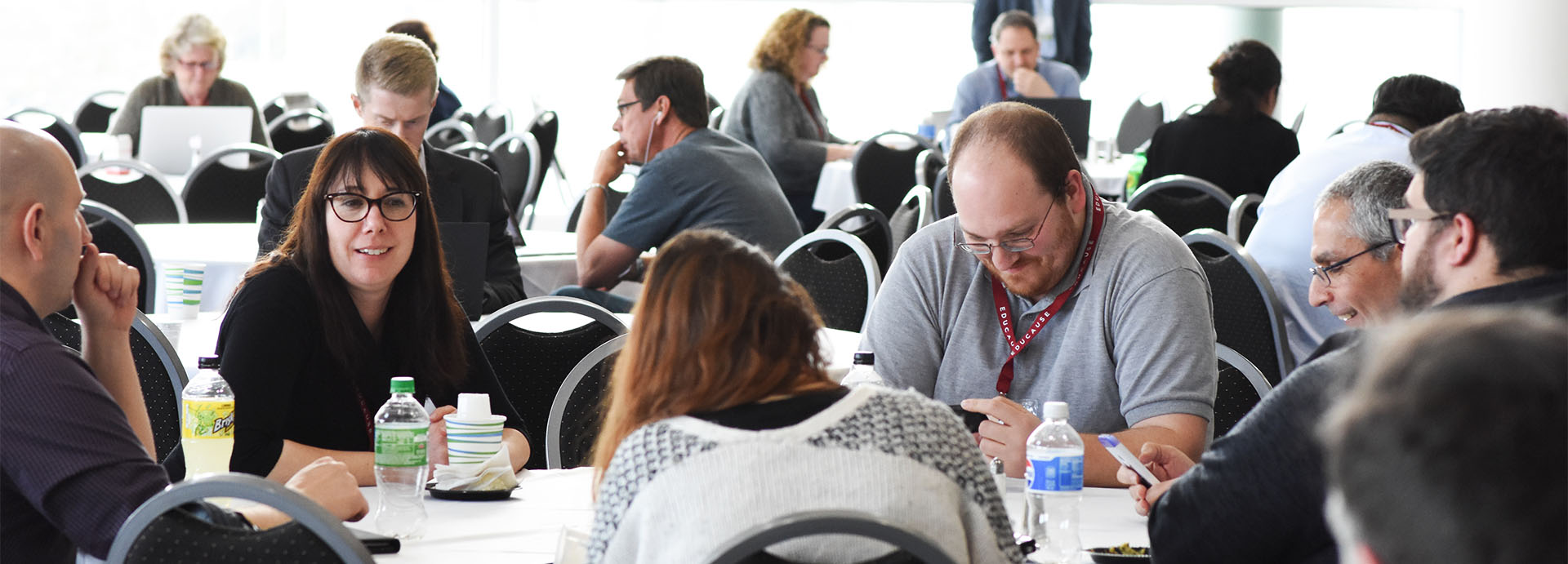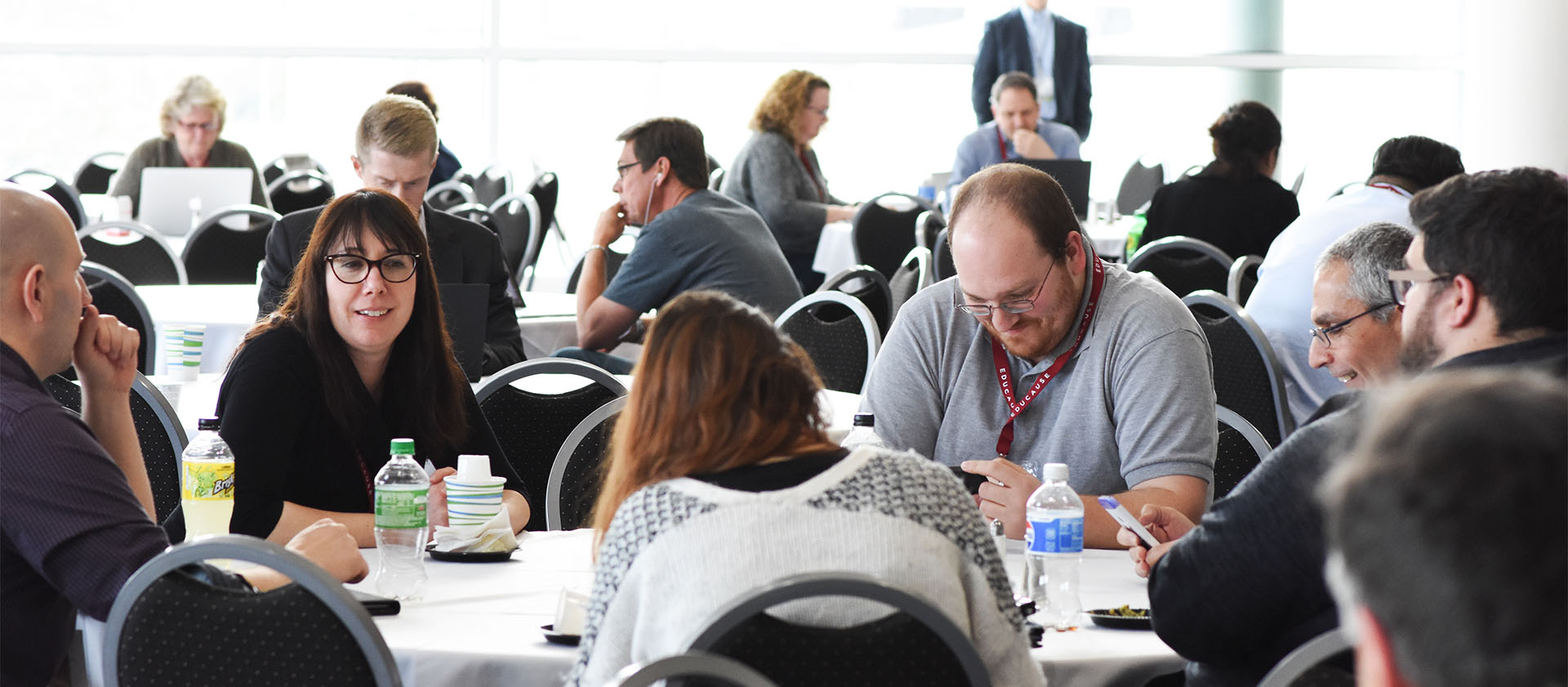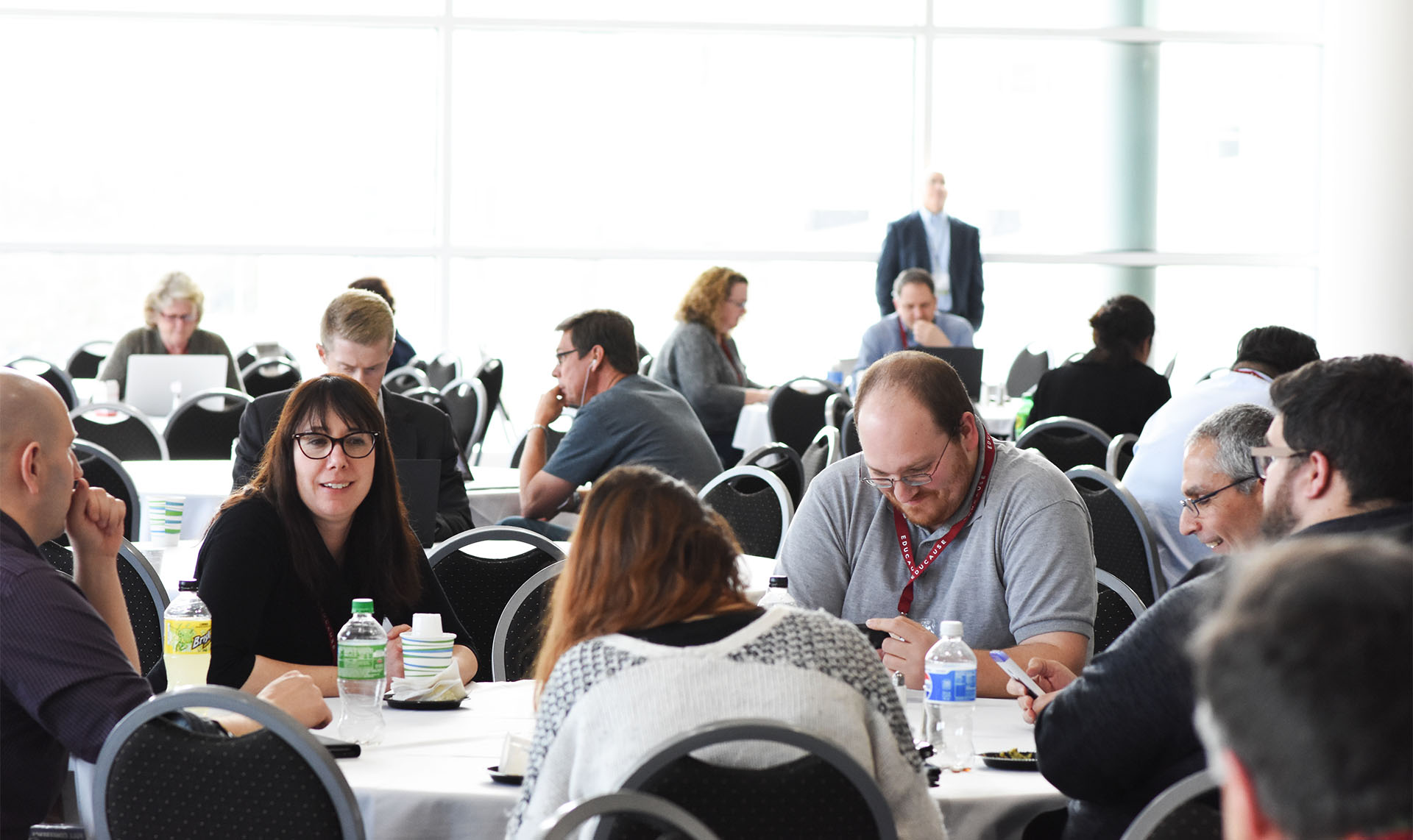- Overview
- Agenda
- Speakers
- Lodging
- Parking and Entry
- Slides/Handouts
Unlocking the Power of Generative AI in Higher Ed - In-Person Workshop
Where: College of the Holy Cross
1 College Street
Worcester, Massachusetts
Directions
When: Wednesday, November 20, 2024
9:00 am - 3:00 pm
Note: Registration starts at 7:30 am
Workshop Organizer: Lance Eaton of College Unbound
Registration Fee:
NERCOMP Member
Early-bird rate through 10/8/2024: $175 (savings of $25)
Member rate after 10/8/24: $200
Non-Member
Early-bird rate through 10/8//2024: $255 (savings of $45)
Non-Member rate after 10/8/2024: $300
The registration covers the workshop, morning break, and lunch.
Event Overview
This day-long event will include a variety of different practice, conceptual, and engaging sessions around how to support faculty, students, and institutions through thoughtful interaction and deployment of generative AI. The sessions will explore how educational developers at different institutions discuss, frame, and use generative AI in their work and the concerns, challenges, and opportunities that arise. Topics include universal design for learning, using AI for instructional design, developing critical AI literacy, building interactive OERs with AI, and considering the role of AI in writing, research, and information literature. Participants can expect to get opportunities to try things out, discuss, and choose sessions that appeal to their interests.
Session Outcomes:
Participants will:
-Broadly navigate the challenges and concerns that generative AI represent
- Develop opportunities for faculty to engage more creatively with generative AI in their teaching and learning
- Implement use cases of GenAI in their daily work
Image credit
Registration Cancellation Policy:
By clicking the "Register Now" button, you indicate a commitment to attend and will be held responsible for the registration fee. Your fee can be refunded if you notify us of a cancellation at least 5 business days before the event via email to nercomp@nercomp.org.
Event Disclaimer:
NERCOMP reserves the right to use any photographs or other mechanical recordings taken at NERCOMP events in promotional materials. No mechanical recordings of any kind may be used at NERCOMP events without the prior written consent of NERCOMP organizers and presenters. The views and opinions expressed at NERCOMP events do not necessarily reflect those of NERCOMP, nor does NERCOMP make any representation regarding the information presented at NERCOMP events.
AI Agenda
7:30 am-9:00 am Registration and Coffee
9.00 am-9:20 am Introduction to the Day
Speaker: Lance Eaton, Director of Faculty Development & Innovation at College Unbound
9:20 am-10:05 am The Power of AI & UDL: A Conduit to Inclusion
Speakers:
Marisha Marks, Instructional Designer, Springfield Technical and Community College
Oressa Power, Instructional Design and Edtech Specialist, William James College
Rebecca Taub, Dartmouth College
This session will provide practical guidance and considerations for the realistic integration of UDL and AI into teaching and learning. The session will explore the new CAST UDL Guidelines 3.0 with an AI lens and how to craft effective chatbot prompts to create more accessible and equitable learning experiences. Participants will gain insights and resources to better utilize generative AI to design inclusive and UDL-supported experiences.
10:05 am-10:35 am Finding Patterns of Strengths & Weaknesses in AI-powered Scoring and Feedback
Speaker: John Swope, Education Technologies
We are all likely tired of the “AI is smart” vs. “AI is dumb” debate in the AI space. This 30-minute session aims to move the conversation forward by recognizing that LLMs are tools that learn from patterns, and because of that they have specific strengths and weaknesses in scoring and feedback tasks. We investigate these strengths and weaknesses by validating the scoring and feedback on specific assignments, segmenting them by a taxonomy, and analyzing the results.
10:35 am-10:45 am Break
10:45 am-11:30 am Concurrent Morning Sessions
Session 1, Option 1: Quick Wins and Creative Solutions: AI for Instructional Design
Speakers:
Judi Brewer
Marc Ebenfield, Director, Center for Excellence in Teaching and LearningUniversity of New England
Elizabeth Fowler,
Erik Hanson, Instructional Designer, University of New England
Renee Parker, Instructional Designer, University of New England
This round robin, AI4ID fun fest provides you with templates for 5 techniques to use AI to assist with instructional design projects. We will break every 10 minutes, so you can switch and go to a different topic to expand your understanding.
Session 1, Option 2: Cultivating a Purposeful Approach to AI
Speakers:
John FitzGibbon, Boston College
Tim Lindgren, Boston College
At Boston College's Center for Digital Innovation in Learning (CDIL), we've been helping faculty engage with AI through design-based, collaborative, experiential working groups. This approach embodies the Formative Education principle of "reflection-in-action," helping faculty make informed decisions about AI by trying something meaningful and reflecting while supported by a community of practice.
In this session we'll briefly share our experiences: Hosting year-long interdisciplinary working groups to support faculty formation in a rapidly changing AI world, Facilitating hands-on AI experiments through building custom chatbots, and Creating a visual language for communicating the use of AI across different constituencies
Switch 11:30 am-11:35 am
Session 2, Option #1: Learning With AI Outside the Classroom
Speaker: Deborah Kronenberg, Assistant Dean of Curriculum Integration, College Unbound
This interactive session will explore how we are all using AI to advance our learning and skills to consider just what this can mean for the classroom and education as a whole. What does it mean for us to be lifelong learners at educational developers, faculty, and students in the age of AI? Collectively, the group will highlight and consider the possibilities this offers higher education.
Session 2, Option #2: Talking to Faculty about AI
Speaker: Heidi Burgiel, Coordinator of Educational Technology, Lasell University
Faculty are under pressure to respond to the advent of AI in education. Join us for a conversation about common concerns and useful solutions. Hot topics include:
-Maintaining academic integrity
-Incorporating AI in coursework
-Privacy and intellectual property
-Learning outcomes for the 21st century
12:15 pm-1:15 pm Lunch
1:15 pm-1:45 pm Concurrent Afternoon Sessions
Session 1, Option #1: OER in the Age of AI
Speakers:
J.M. Grenier, Urban College of Boston
Peter Shea, Director of Professional Development, Middlesex Community College (MA)
With the appearance of generative AI, the ability to create new forms of OER has emerged. Join this discussion with two instructional designers as they provide examples of exciting new forms of OER.
Session 1, Option #2: AI Toolbox for Academic Research and Writing/Information Literacy & Generative AI Workshop
Speakers:
Laura Roberts, Assistant Teaching Professor in the Integrative and Global Studies Department, Worcester Polytechnic Institute
With a growing selection of AI tools—from ChatGPT, CoPilot, and Perplexity to SciSpace, Elicit, and beyond—it’s easy to feel overwhelmed by the options for research and writing. This workshop explores ways to help faculty identify which AI tools best suit different academic purposes and create policies that promote effective and responsible AI use. We’ll discuss strategies to ensure students use AI to assist with their academic work without delegating too much of the work to AI. You’ll leave with practical resources and tips to integrate AI thoughtfully into academic work, and you may even discover new ways AI can enhance your own research.
1:50 pm-2:20 pm Concurrent Sessions
Session 2, Option #1: Demystifying Generative AI: A Community-Wide Approach to AI for All
Speakers:
Mike Hamilton, Instructional Technologist II, Worcester Polytechnic Institute
James Monaco, Instructional Media Coordinator, Worcester Polytechnic Institute
Valerie Smedile Rifkin, Instructional Designer II, Worcester Polytechnic Institute
In this 30-minute session, we will share our experience teaching staff at Worcester Polytechnic Institute to effectively integrate AI tools into their daily workflows, focusing on the process we used, the lessons we learned, and the impact AI has had on their work. Our presentation will offer insights into how we introduced AI technologies such as Microsoft Copilot to a diverse group of professionals, guiding them through practical applications and ethical considerations.
Session 2, Option #2: The Human Touch: Generative AI and Writing Assessments
Speaker:
Dana Gavin, Director of the Writing Cente, Dutchess Community College
Educators who use writing assessments as a mainstay of their pedagogy are still facing challenges with how to effectively design assignments and assess knowledge acquisition and retention in the wake of generative AI. This workshop focuses on practical steps to design assessments as well as manage student and educator expectations for each other's capabilities.
2:30pm-2:25pm: Switch Sessions
2:25 pm-3:00 pm: Wrap-up
Speaker: Lance Eaton
3:00 pm End
Judi Brewer
Judi is an Instructional Designer at the University of New England, working with subject matter experts and programs to collaborate in creating exceptional learning experiences for students. She has a vast interest in how AI can be a tool for students, faculty, and designers to enhance and deepen critical thinking, creative exploration, and supporting the educational journey.
Heidi Burgiel
Heidi Burgiel is the Coordinator of Educational Technology at Lasell University near Boston. A queer woman in STEM with a keen awareness of accessibility, she applies her extensive experience in faculty professional development, technology systems, and college mathematics instruction to improve learning and teaching experiences for all.
Marc Ebenfield
Marc Ebenfield directs the Center for Excellence in Teaching and Learning at the University of New England. He has been invited to speak on AI for student success, AI for information literacy and building bots for teaching and learning. He has also presented on using forecasting tools to consider how AI may change the work of teaching centers.
Lance Eaton
Lance Eaton is the Director of Faculty Development & Innovation at College Unbound, a part-time instructor at North Shore Community College, and a PhD student at the University of Massachusetts, Boston. He has given talks, written about, and presented at conferences on artificial intelligence generative tools in education, academic piracy, open access, OER, open pedagogy, hybrid flexible learning, and digital service-learning. His musings, reflections, and ramblings on AI and Education can be found on his blog: https://aiedusimplified.substack.com/
Elizabeth Fowler
Information available soon
Dana Gavin
Dana Gavin, PhD, is the director of the Writing Center at Dutchess Community College; she recently earned her PhD in English (with concentrations in Literature & Culture and Technology & New Media) from Old Dominion University. Her research into serialized crime fiction produced through the nineteenth-century British publishing industry teed her up, believe it or not, for the November 2022 crash-landing of ChatGPT into our educational worlds. Teaching writing and facilitating learning experiences where people can become confident communicators are her primary objectives.
Mike Hamilton
Mike Hamilton is an Instructional Technologist II at Worcester Polytechnic Institute, specializing in leveraging instructional technologies to enhance teaching and learning for faculty, staff, and students. He focuses on integrating AI tools to enhance staff efficiency, collaborating with campus departments to drive the adoption of innovative AI-powered platforms and solutions.
Erik Hanson
Erik Hanson is an Instructional Designer at UNE, where he collaborates with Subject Matter Experts to design and fully build online courses for graduate, post-bacc, and continuing ed programs. He is interested in the dynamic tension between designing assignments that challenge rote AI completion and those that foster meaningful engagement with AI tools.
Deborah Kronenberg
Deborah is Assistant Dean of Curriculum Integration for College Unbound where she weaves liberatory and relational teaching and learning into the core curriculum. Her MFA in Interdisciplinary Arts from Goddard College focused on what higher ed can learn from ensemble theatre. She has run communities of practice, presented, and published on creating anti-racist, relational, playful educational journeys in post-secondary institutions. Deborah has trained faculty, artists, and educational leaders to center love, interdependence, relevance, and impact in learning both in person and online, through curriculum and through facilitation. She can usually be found pulling people into an activity to build and create together.
Marisha Marks
Marisha Marks is an instructional designer at Springfield Technical and Community College. Marisha has been assisting faculty with online pedagogy and course design for over a decade, learning and teaching about promising practices with student success in mind. Marisha’s area of interest is in accessibility and Universal Design for Learning. Marisha looks for opportunities to remove student barriers to learning with AI, technology, and innovative teaching strategies.
James Monaco
James Monaco is the Instructional Media Coordinator at Worcester Polytechnic Institute, where he specializes in training and assisting faculty and students in creating media for courses and publications. With a focus on enhancing educational content, Jim integrates cutting-edge machine learning and AI tools into media production, advancing the way educational materials are developed and delivered.
Allison Papini
Allison Papini is Assistant Director/ Manager of Research and Instruction Services at Bryant University in Smithfield, RI. Allison is a Rhode Island native who received her BA in History- Secondary Education from Providence College, her MLIS from the University of Rhode Island, and her MBA from Bryant University. She has a wide array of academic interests including artificial intelligence, information literacy instruction, emerging technology, team-based learning, evidence-based medicine, publishing ethics, and intellectual freedom. Allison represents the library and university by working with groups focusing on generative AI and its implications for libraries and higher education as a whole.
Renee Parker
Renee is a seasoned Instructional Designer who works for the University of New England. With a primary focus on building engaging online courses, she is passionate about building memorable learning experiences. She leverages prompt engineering to enhance her instructional design process and assist with creating innovative learning solutions.
Oressa Power
Oressa Power is an instructional design and edtech specialist in Boston, Massachusetts. She is dedicated to supporting faculty and communities of practice in developing inclusive and engaging learning experiences.
Laura Roberts
Laura Roberts is an Assistant Teaching Professor in the Integrative and Global Studies department at Worcester Polytechnic Institute (WPI). Prior to joining WPI, she worked in the nonprofit sector with organizations addressing health equity, food insecurity, and educational access. As a practitioner turned academic, Professor Roberts brings unique perspectives from the field into her classroom. In a recent project, Roberts developed decision-making guidelines to help faculty and students choose appropriate AI tools for the different stages of the research and writing process.
Brian Salerno
Information avilable soon
Peter Shea
Peter Shea is a learning professional of three decades of experience. He has been involved in AI for learning for several years before the emergence of ChatGPT.
Valerie Smedile Rifkin
Valerie Smedile Rifkin is an Instructional Designer II at Worcester Polytechnic Institute, where she specializes in creating innovative and effective learning experiences for both online and in-person classes. By integrating technology and pedagogy, Valerie supports faculty and students by enhancing educational outcomes through tailored instructional strategies and dynamic course design practices.
John Swope
John Swope is an education technologist who has been building large-scale, open online courses since 2012. He chairs the AI in Higher Education Committee at St. George’s University and the Open edX® educators working group. He has worked with some of the world's premiere educational institutions developing their open online education offerings.
John focuses on developing pragmatic AI solutions. Pragmatic means effective and measurable, without the rhetoric. John shares a weekly AI "MicroApp" focused on some area of course development or assessment.
John lives with his wife, two boys, and youngest daughter in the greater Boston area. His day doesn't start without a coffee (or two) and a crossword puzzle. He loves coaching his children (poorly) in their respective sports.
Rebecca Taub
Information available soon
Hotel Information:
Hotel Information:
Rooms are available at the Holiday Inn Express, 10-12 Johnson Street in Auburn, MA. 01501
Call the hotel directly at 1-508-832-2500 or book here.
Parking:
Please park in the Hogan Campus Center lot. Parking is free. When you enter campus from the last gate on the left (Gate 7) you will soon see a series of large parking lots on your right going all the way up to the Hart Athletic Center. All of those lots are general parking. As long as you make sure not to park in student or faculty/staff parking lots there shouldn’t be any problems.
See Campus Map for Parking locations
There is an electric vehicle (EV) charging stations in the parking garage for a fee. The stations are on the ChargePoint network and the ChargePoint website has information to utilize your smartphone to use the ChargePoint network.
Building Access:
You may enter the building via the steps or ramp adjacent to the parking lot. You are actually entering on the 3rd floor.
Elevators:
You will enter on the 3rd floor and take the elevator up to the 4th floor.
Restrooms
There are accessible restrooms located within the Hogan Campus Center on each floor
Presentations, Slides and Handouts:
1. AI & UDL (Oressa Power,Marisha Marks, and Rebecca Taub)
2. Talking With Faculty About AI (Heidi Burgiel)
4. Automating Rubric Creation (Renee Parker)





